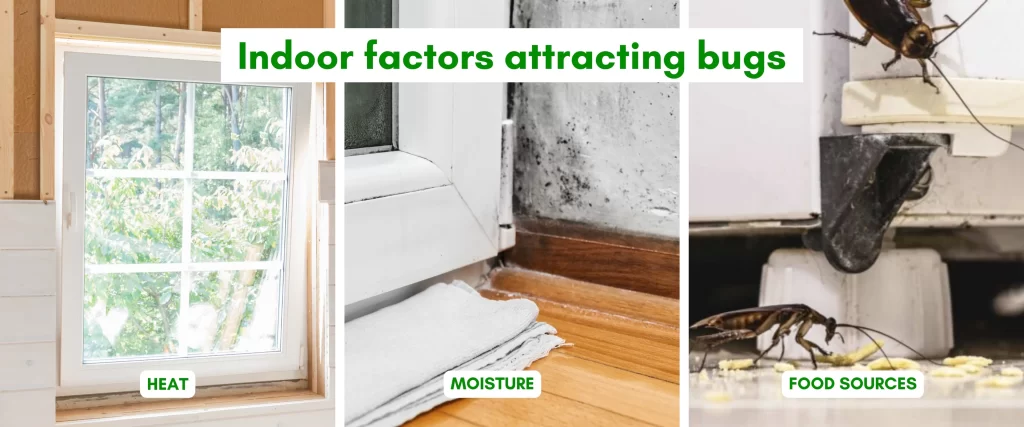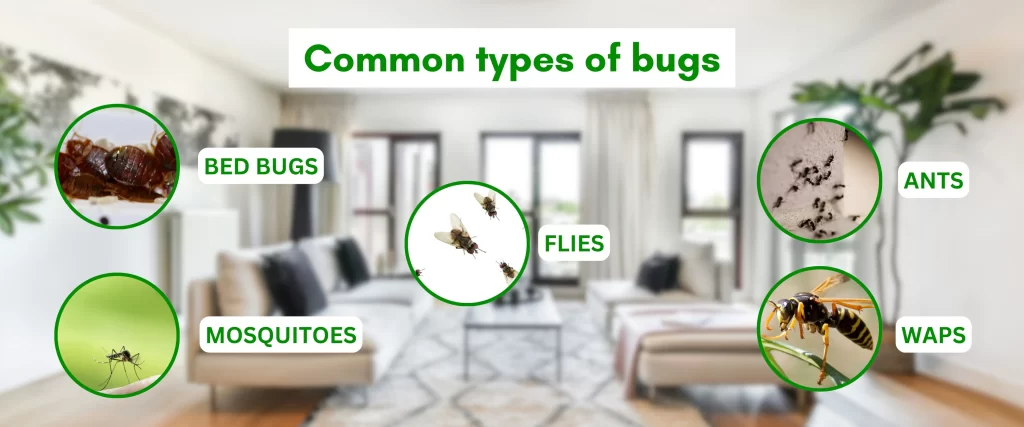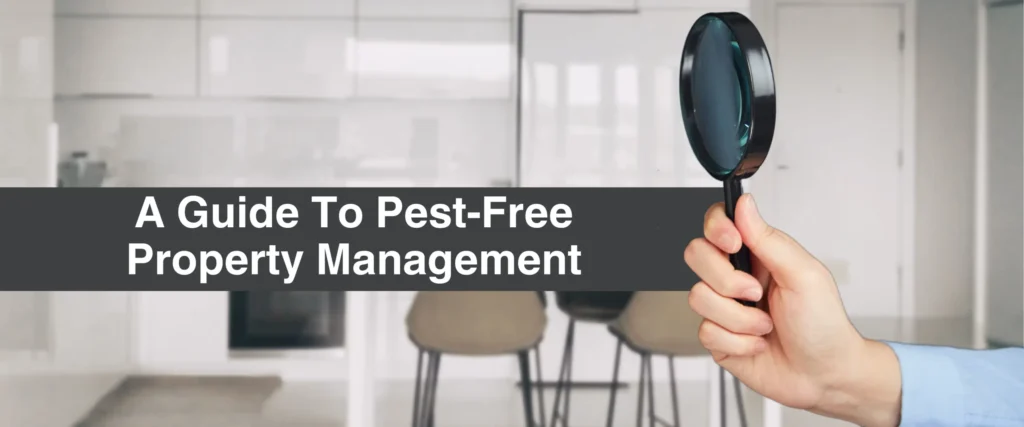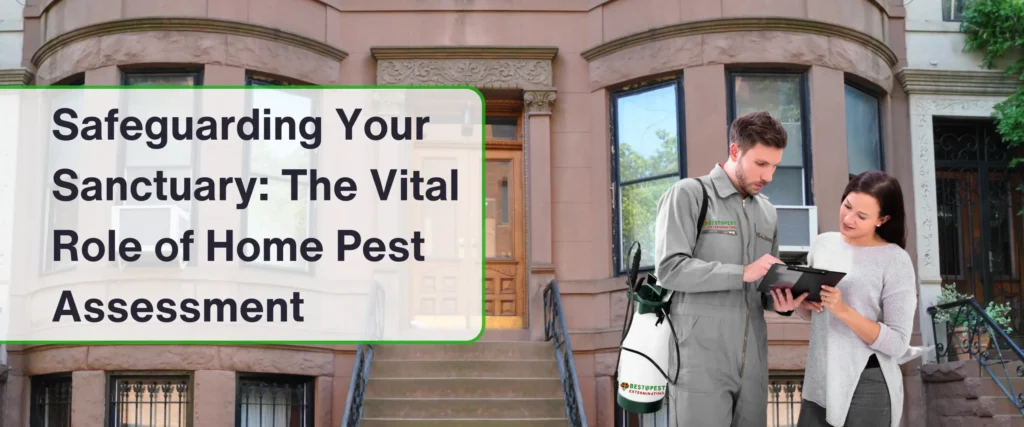
Summer Bugs in House: How to Keep Them Out and Why They Invade
As temperatures rise and the days grow longer, many of us look forward to enjoying the warmth and sunshine of summer. However, with the pleasant weather comes an unwelcome side effect: an invasion of bugs in our homes. Bugs are an inevitable part of summer, but they don’t have to ruin your indoor comfort. By understanding their behavior and taking proactive steps, you can enjoy a bug-free home. This blog will guide you through why bugs invade during summer, identify common pests, and provide practical solutions to keep them out and eliminate those that manage to get in.
Why Do We Experience Bugs In House During Summer?

Heat and Moisture
During summer, the outdoor heat drives many bugs inside in search of cooler, more humid environments. Many bugs thrive in high humidity, making your home an attractive destination if it’s cooler and more humid than the outdoors. For instance, cockroaches and silverfish are particularly drawn to damp, cool areas like basements and bathrooms.
Food Sources
Summer often means more food preparation and outdoor dining, which can lead to more crumbs and spills. These food remnants are a feast for bugs. Ants are particularly drawn to sugary substances, while flies are attracted to decaying organic matter. Mosquitoes, on the other hand, are drawn to stagnant water and can breed rapidly if given the opportunity.
Common Summer Bugs
- Ants: Tiny and industrious, they form long trails to and from food sources.
- Mosquitoes: carry diseases and are notorious for their itchy bites.
- Flies: Quick breeders that can spread bacteria.
- Bedbugs: Thrive in warm climates and travel easily, often found in hotels and homes.
- Wasps: Can become aggressive and are attracted to sugary foods.
Common Summer Bugs Found in Houses

Ants
Ants are small but can become a significant nuisance due to their numbers and persistence. They enter homes searching for food and water, forming visible trails as they march to and from food sources.
Mosquitoes
Mosquitoes are more than just an annoyance; they are most active during dawn and dusk and are attracted to stagnant water where they lay their eggs.They can carry diseases like West Nile Virus and Zika Virus.
Flies
House flies can breed rapidly and are attracted to decaying food and waste. They can contaminate food and surfaces with bacteria.
Bedbugs
These small, reddish-brown insects hide in cracks and crevices during the day and come out at night to feed on blood. Bedbugs are often found in mattresses, bed frames, and furniture, and their bites can cause itchy welts.
Wasps
Wasps are attracted to sweet foods and can be very aggressive. They often build nests in sheltered areas like eaves, attics, and garages.
How to Keep Bugs Out of House in Summer
Use Screens
Installing and maintaining window and door screens is one of the most effective ways to keep bugs out. Regularly check for and repair any holes or tears.
Seal Entry Points
Inspect your home for gaps and cracks around doors, windows, and the foundation. Use caulk or weather stripping to seal these entry points, preventing bugs from sneaking in.
Proper Waste Management
Keep your kitchen clean and dispose garbage regularly. Use sealed containers to store food and ensure your trash cans have tight-fitting lids.
Reduce Standing Water
Eliminate standing water in and around your home to prevent mosquitoes from breeding. This includes emptying plant saucers, cleaning gutters, and covering or draining pools and birdbaths.
How to Get Rid of Summer Bugs In House
Natural Remedies
- Ants: Clean surfaces with a vinegar and water solution to deter ants. Placing cucumber peels, cinnamon, or mint leaves near entry points can also help.
- Mosquitoes: Use essential oils like lavender, peppermint, and eucalyptus to repel mosquitoes naturally.
- Flies: Create a homemade fly trap with apple cider vinegar and a few drops of dish soap. The vinegar attracts flies, and the soap breaks the surface tension, causing them to drown.
- Bedbugs: Wash bedding and clothing at high temperatures and use a vacuum to clean mattresses, bed frames, and surrounding areas. Encase mattresses and box springs in protective covers.
- Wasps: Mix water and dish soap in a spray bottle and spray wasp nests from a safe distance. The soap solution will suffocate them.
Chemical Treatments
For severe infestations, consider using chemical treatments. Always follow the manufacturer’s instructions and consider professional pest control services for safe and effective application.
Preventative Measures for Future Summers
Regular Maintenance
Perform regular inspections and maintenance on your home. Fix any damage promptly, and ensure your home’s exterior is well-maintained to prevent bugs from finding entry points.
Cleanliness
A clean home is less attractive to bugs. Regularly clean floors, counters, and other surfaces to remove food residues and crumbs. Vacuum frequently and dispose of garbage regularly.
Landscaping Tips
Maintain your yard to reduce bug habitats. Trim bushes and trees, mow the lawn regularly, and keep compost and garbage areas away from the house. Consider planting bug-repellent plants like lavender, marigold, and rosemary around your home.
Conclusion
Dealing with summer bugs in the house can be challenging, but with the right knowledge and preventive measures, you can keep your home comfortable and bug-free. From understanding why bugs invade to implementing effective strategies to keep them out, this comprehensive guide has covered all the essential aspects.
Remember to:
- Regularly maintain your home to seal off entry points.
- Keep your living spaces clean and free of food residues.
- Use natural or chemical treatments as needed to tackle existing infestations.
- Take preventative measures to minimize future invasions.
Frequently Asked Questions (FAQ)
Q: What are some natural remedies to repel ants?
A: Natural remedies to repel ants include using a mixture of vinegar and water to clean surfaces, placing cucumber peels, cinnamon, or mint leaves near entry points, and using essential oils like peppermint or tea tree oil.
Q: How can I prevent mosquitoes from breeding around my home?
A: To prevent mosquitoes from breeding, eliminate standing water in birdbaths, plant saucers, gutters, and other areas. Regularly change water in outdoor containers and consider using mosquito dunks in ponds or large water features.
Q: What should I do if I find a wasp nest near my house?
A: If you find a wasp nest, it’s best to handle it with caution. You can use a mixture of water and dish soap in a spray bottle to suffocate the wasps. If the nest is large or in a difficult-to-reach area, consider contacting a professional pest control service.
Q: Are chemical treatments safe to use around pets and children?
A: Chemical treatments can be effective but should be used with caution, especially around pets and children. Always follow the manufacturer’s instructions and consider using natural remedies or hiring a professional pest control service for safer options.
Q: How can I prevent bedbugs when traveling?
A: To prevent bedbugs when traveling, inspect hotel rooms for signs of bedbugs, keep your luggage on a luggage rack away from the bed, and wash all clothes and luggage thoroughly after returning home. Using protective covers on mattresses can also help.


